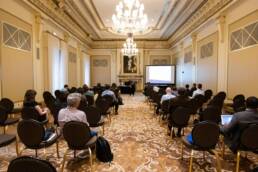82nd Annual Midwest Political Science Association Conference
Thursday, April 3 through Sunday, April 6, 2025
Hybrid Format: In-Person at the Palmer House Hilton in Chicago, IL or Online
All Panels/Paper Sessions, Roundtables, Lightning Talks and Working Groups will Feature a Hybrid Format (for In-Person or Virtual Participation). Undergraduate Poster Sessions will be In-Person Only
Conference Program Co-Chairs:
Hans C. Noel, Georgetown University
Jae-Jae Spoon, University of Pittsburgh-Pittsburgh Campus
About Working Groups / Conferences-within-a-Conference
Individuals holding a Ph.D. may submit a proposal to convene a conference-within-a-conference, or multiple organized sessions related to a single theme, topic, or area of study. Proposals are reviewed on a case-by-case basis. The convenor(s) are responsible for recruiting participants, organizing them into sessions, and facilitating communication and cooperation within the group. MPSA staff will assign meeting space, provide for the logistical needs of the group, maintain a roster of participants, help to promote the event, and work with the convenor(s) to accommodate scheduling requests. This is an excellent opportunity for cohorts to gather around specific areas of study that may not be well-represented in the normal conference sections, or to develop specific projects like an edited volume.
If you are interested in organizing a Working Group or Conference-within-a-Conference, please contact MPSA Professional Development Manager, Lewis Hoss, Ph.D. at hoss@mpsanet.org.

2025 Conferences-within-a-Conference
Association for Politics and the Life Sciences Annual Conference
The 2025 Annual Meeting of the Association for Politics and the Life Sciences (APLS) will be held on Friday afternoon at the MPSA conference. APLS is dedicated to the advancement of research pertaining to the following broad categories: new directions in politics and the life sciences, biopolitics, life science policies (e.g., health policy, genetically modified foods, stem cell research), neurobiology and politics, bioethics, bioterrorism, environmental policy and communication (e.g., media coverage and public opinion about climate change), genetics and politics, biotechnology, and other biopolitical topics. This year’s conference features new research in politics and the life sciences, along with a keynote and reception on Friday afternoon.
Convenor: Patrick A. Stewart, University of Arkansas
Affective Polarization and Depolarization: Insights and Innovations
This mini-conference aims to bring together a diverse group of scholars to explore the latest research on the causes and consequences of affective polarization. The conference will also focus on addressing measurement challenges and methodological advancements across individual, elite, and country-level analyses. Furthermore, it will examine interventions and policies aimed at reducing affective polarization and fostering more cohesive societies.
Convenors: Yunus Orhan, North Dakota State University and James Adams, University of California-Davis
